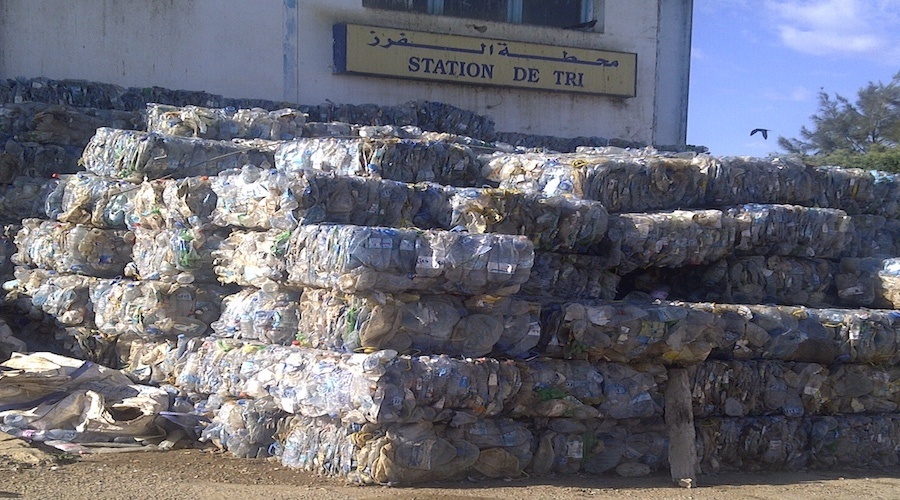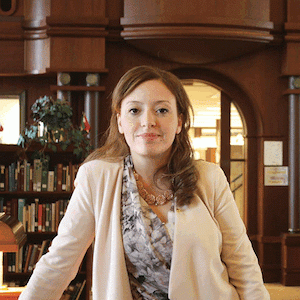How this Algerian entrepreneur is recycling plastic waste

Unemployment rate in Algeria increased to 10.5 percent, reaches almost 27 percent of the youth, and 20 percent of women, according to figures released by the International Monetary Fund in 2016.
Besma Belbedjaoui, 33, an Algerian graduate holding a diploma in genetics and molecular biology and another one in communication and marketing, faced the fate of many Algerians, when she kept on searching for a job during two years, with no luck.
At this point, she decided to create a startup that would be useful to her country.
During her daily observations, she realized that many people known as ‘chiffonniers’ (people who collect and sell trash) were actually sorting trash, and selling what they collect to factories. It was similar to an economic production chain. However, it was informal and the public authorities were not properly interfering and interacting.
The country produces 16 million tons of waste per year. As many countries in Africa, Algeria is still using plastic wrapping and bags in supermarkets for instance. Five million plastic bags are used in Algeria and only five percent of the waste is recycled. In 2017, Tunisia banned single-use plastic bags in supermarkets to also reduce plastic waste.
Based on the numbers of the National Agency of Waste, Belbedjaoui found that the market of waste recycling in Algeria could represent $530 millions, in other terms, a great business opportunity, in addition to the country’s gas business. So she decided to launch Plasticycle in 2011, a startup that recycles plastic in Algeria.

Starting a new waste business
“The trickiest part was that all this was new in Algeria. I had to find the supplier for the recycling tools and to elaborate a production chain,” she told Wamda.
To launch her concept, she used her personal savings, and got a loan for an undisclosed amount from the National Agency to Support the Employment for the Youth. Such loans range between 5-10 million Algerian dinars (between US$ 46,000 and $90,000), according to the agency’s website.
Facing three challenges
She started her startup and factory in Constantine, a city in the east of Algeria, where 50 percent of the companies that produce plastic waste are based. “It was an opportunity I had to take because no one was really interested in this market at that time,” she said.
The first challenge she overcame was finding the recycling machine, which she imported from China. She collects waste of granules of polyethylene terephthalate, then grinds them in her factory. The waste is washed, dried, and turned into granules. Once this is done, she sells the granles to companies that use them to manufacture textile or wrapping. Belbedjaoui did not disclose the selling price.
Despite the struggles, the company has now five full time employees, making profits and is not looking to fundraise, according to Belbedjaoui.
She is currently working with six companies, including Accor Hotels. She buys their waste, refines it, and sells it back to them. She buys the the kg for 28-30 Algerian dinars (US$ 0.25 - 0.27), and resells it recycled at 100 dinars (US$ 0.9), as she revealed in an interview.
However, the process is often threatened by the monopoly of these ‘chiffonniers’ who rummage through garbage dumps, select and collect the waste and then resell it to people like Belbedjaoui. “They are the ones to impose the prices. We have to pay for the waste, so it is a very unstable market. Since there is no regulation, the prices can raise whenever the collectors want them to,” Belbedjaoui said. Buying from the private sector companies can be at higher prices, that would reach up to 120 dinars (US$ 1.09) per kg. This puts back the likes of Belbedjaoui at mercy of the informal sector, which also can manipulate the pricing.
The plant can process 1.2 tons per day and its daily production of granules is 300 kg. However, she cannot reach this capacity when she can't buy waste.
Her last challenge was starting young and alone. “I was 26 years old when I started this. No one [understood] what I was doing in my family. It was also difficult to explain what I was doing since it didn't really exist. I felt I became ten years older in one year,” she added.
Lacking governmental intervention
For Brahim Djemaci, a college teacher who studied the usage of waste in France and in Algeria, the problems Belbedjaoui faced are similar to that of other companies in the field of recycling in Algeria.
In France, Eco-Emballage for instance is a governmental company that covers the majority of the recycling cost of companies that produce waste. Then after sorting and collecting, the company sells the products to recycling company.
“There is no clear national procedure to waste recycling in Algeria despite the fact that the government signed several programs such as the ECO JEM,” Djemaci said. Inspired by the French model, and under the ECO JEM program, the government was supposed to impose low taxes on companies that produce plastic, to secure the essential costs of the the recycling process. However, this never worked out in Algeria because the government did not specify the tax to be due.
“In Algeria instead, most of the sector of sorting and collecting belongs to the informal sector. So, it is difficult for recycling companies to thrive,” Djemaci added. The last number of the informal workers collecting waste was up to 20,000 in 2008, according to a study by Djemaci.
Starting an ecosystem
Belbedjaoui’s commitment allowed her to soothe her doubts and insecurities. She was not only able to sell the transformed waste to industrial companies but also to support small companies to adopt her same approach, so the market can actually build itself.

“There are 200 companies in Algeria which take care of the waste. This enables us to lobby in front of the government and industrials so that more people get more sensibilized to the issue of plastic waste in Algeria,” she said.
Belbedjaoui doesn’t consider the new companies as competition but rather as partners who might help creating an ecosystem. Her next step will be leading her compatriots to adopt a greener behavior and to be aware of the issues related to plastic waste. Even though selective sorting doesn’t currently exist in Algerian homes, Belbedjaoui hopes it will come along as well as a government policy focused on waste.
Feature image via Plasticycle


